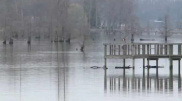North Sea Gas Platform Spilling Millions Of Cubic Feet Of Methane Per Day
Off the coast of Scotland, a gas platform operated by French energy company Total has been spilling millions of cubic feet of methane per day for over two weeks.
The Elgin platform, which is located in the North Sea, has been releasing about 7 million cu. ft. of methane gas every day since the leak's detection on Mar. 25 -- creating a disaster that has been likened to 2010's Deepwater Horizon disaster.
In response to the BP comparison, Total Chief Financial Officer Patrick de La Chevardiere was reported by the Washington Post as maintaining it wouldn't be accurate.
“While we understand that comparisons to Macondo are inevitable, we would like to state clearly that the situations are very different,” he said in a conference call to analysts and reporters. “There is no crude oil involved here and therefore the current impact on and risks for the environment are relatively low.”
The comparisons, however, seem easy to make. The Herald Scotland reports the energy company may use control methods similar to how operators tried to stop the BP spill -- including a "top kill" strategy as well as digging relief wells.
It is also similarly expensive. Although Total has also reassured investors that the financial damage would be limited, the energy company told Reuters the leak is costing the company $2.5 million per day.
Richard Dixon, director of the WWF Scotland, told BusinessWeek the environmental damage could also be significant. Methane is a greenhouse gas that has 25 times the warming effects of carbon dioxide.
And, unlike what Total's CFO said, crude oil may also become involved in this spill.
"Elgin is sending methane into the atmosphere, which is a greenhouse gas, so there is some environmental impact at the moment. There is also oil in that well, and Total need to move before an oil spill becomes part of this leak," he said.
Some experts estimate it may take up to six months for the leak to be completely repaired.
Time Magazine said the amount of methane released over six months would damage the atmosphere just as much as if 300,000 new cars were put on the road.
Although Scotland's fish taste testers have found no contamination in samples, Greenpeace is conducting its own investigation. The environmental organization has traveled up to the North Sea to collect air and water samples to be analyzed in Germany.
Greenpeace campaigner Christian Bussau is among the crew traveling to the arctic. He told Reuters the spill shows how the excavation of energy resources is too hazardous to continue.
"This is far too dangerous, this is far too risky, and therefore we do not want the oil industry to go into the arctic," he said.
The following video shows footage from Greenpeace, who report there is an oil slick on the surface near the platform.
WATCH:






